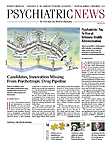Legislative action affecting provision of mental health care in the Veterans Health Administration (VHA) is moving through Congress, but not always as quickly as veterans’ advocates would like.
In a remarkable display of bipartisanship and speed, for example, the Veterans Access, Choice, and Accountability Act of 2014 became law in August. The law was in part a response to the appointment-scheduling scandal that led to the resignation of Veterans Affairs Secretary Eric Shinseki last May.
The new law allows veterans who face a waiting time for an appointment of more than 30 days or who live more than 40 miles from a VHA facility to obtain care for service-connected issues outside the VHA system. This program will end in three years or when the $10 billion allocated for it is used up.
The act also provides for hiring new medical personnel in several fields, including mental health, and adds 1,500 graduate medical education residency slots.
“APA is pleased because the act will expand health scholarship education programs for shortage professions—including psychiatry—and increase the loan repayment limit from $60,000 to $120,000,” said Lizbet Boroughs, deputy director of APA’s Department of Government Relations. Pay increases for all VHA physicians and dentists will go into effect November 30 (see page 1).
The law also mandates a series of study reports from the VA Office of the Inspector General. These will cover details on staffing levels at each VHA medical facility, including plans for addressing issues such as wait times, workload levels, staffing models, staffing shortage areas, and the VHA’s use of direct appointment authority to fill staffing shortages. Another study will detail the top five professional vacancy areas, which almost certainly will include psychiatry, given prior studies of medical staff shortages.
One thing that hasn’t happened yet is a long-dreamed-of but so far unrealized “seamless” connection between the medical systems of the Department of Defense and the VHA that would make the transition from care during active service to civilian life easier for veterans.
APA has worked closely with several veterans’ service organizations, including Vietnam Veterans of America and the Iraq-Afghanistan Veterans of America, to craft the Ensuring Veterans’ Resiliency Act (EVRA). This measure was not passed on its own, but much of its language was incorporated into other legislation, Boroughs pointed out. Still other elements are likely to work their way into other measures in the next session of Congress, she said.
A more subtle transformation has occurred inside the VHA as well, noted Boroughs. Formerly, psychologists dominated the high-ranking mental health “consultant” positions at the VHA’s Washington, D.C., headquarters. Now, four of those offices are run by psychiatrists: APA members Ira Katz, M.D., Ph.D., Harold Kudler, M.D., Marsden McGuire, M.D., and Dean Krahn, M.D.
In addition, APA continues to work with the veterans’ service organizations on two legislative packages whose aim is to improve vets’ mental health—HR 5059, the Clay Hunt SAV Act, and S 2182, the Suicide Prevention for American Veterans Act.
Both legislative packages have widespread bipartisan support and contain language originally in EVRA, said Boroughs. The House bill has more than 107 cosponsors and is sponsored by the Republican chair of the House Veterans Affairs Committee. If not passed in the lame-duck session between the November 4 election and the start of the next Congress in January, both package bills will likely be reintroduced. ■
